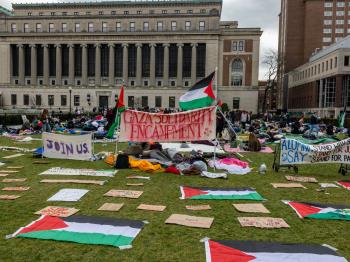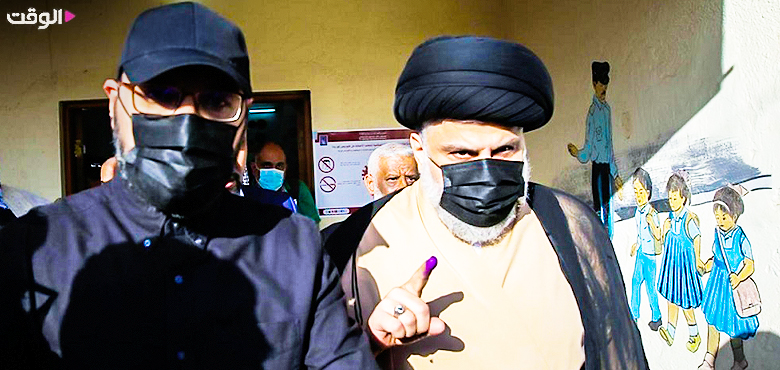Alwaght- While the process of the government formation in Iraq a month after the parliamentary election remains in political gridlock as a result of the protest of a number of Shiite factions that questioned the credibility of voting and courting mechanism, now all eyes are on the stances of Muqtada al-Sadr, the leader of Sadrist Movement and Saerun parliamentary coalition which holds the majority with 73 seats.
Al-Sadr, who in his recent statement stressed the need to form an inclusive government, raised hopes among other Shiite movements that they could reach an agreement with him to form a coalition, and even the Shiite Coordination Framework (SCF), a coalition of Shiite parties excluding Sadrist Movement, said that it was in negotiations with the movement for a return to the Shiite body as a prelude to an agreement. However, in a move contrary to expectations, al-Sadr in his latest televised speech set conditions for the inclusion of political forces in the process of forming a new cabinet, which in practice made the situation even more complicated than before.
In one of his most important conditions, al-Sadr called on the groups protesting the election results to "immediately" disband the armed groups and deliver the arms to Popular Mobilization Forces (PMF), a voluntary force formed in 2014 in opposition to ISIS terrorist group, via the chief of general staff. He added that the PMF should not participate in the political process.
Following the comments, on Friday, al-Sadr said that as a measure of goodwill, he dissolved Yaum Allah Brigade.
Yaum Allah Brigade was founded by him in 2008 to fight the American occupying forces. It was reactivated in 2014, the year ISIS seized large tracts of Iraqi territory, following a fatwa by the grand Shiite cleric in Iraq Sayed Ali al-Sistani as part of the PMF, also called Hashd Al-Sha'abi. Al-Sadr has another armed group under his command called Saraya Al-Salam that also acts under the PMF and thus is a legal force.
Conditions with dual goals
Certainly, the conditions set to others, especially the Shiite factions, are simple but not easy. On the one hand, they look simple because the management of forces and their arms under the PMF is a demand that the powerful factions in the PMF are seeking. On the other hand, fact-checking of this issue is not easy because the turbulent conditions in Iraq in the past years during ISIS crisis and especially after the US sought ways to keep its forces in the country and thus resorted to destabilization caused a situation in which management of arms is not easy. Some armed and violent measures are made by anti-PMF forces to blacken the image of the voluntary force. The latest action was the apparantly staged drone attack on the house of Prime Minister Mustafa al-Kadhimi that was meant to block possible alliance between Sadrist Movement and the SCF.
Al-Sadr is not unaware of this reality. So, his conditions are dual-faced. On the one side, he looks to save his vote base which is constituted by people discontented with the past management by putting up a uncompromising, anti-corruption face. His demand for delivery of corrupt figures to an independent court and exclusion of militias to the PMF are to this end.
On the other side, he is sending a warning to the Sunni and Kurdish sides.
Firstly, al-Sadr is well aware that the resistant groups are powerful in the political arena, and that the results of the current elections, even in case of no change in the future, do not reflect the social and political status of the resistant groups. It is noteworthy that the Sadrist Movement gained less votes than Fatah Coalition. In other words, the Saerun Coalition ranked first thanks to the new election law, while in terms of popular votes the Fatah Coalition outnumbers it. The new law adopts "single non-transferable vote system" (one vote, one candidate, multiple seats per constituency).
According to the old electoral system (open or closed list), the votes obtained by one candidate can be distributed among other candidates of the same party, in such a way that if, for example, 5,000 votes are needed to win a seat in parliament and one of the candidates gets 10,000 votes, the surplus will go to another candidate from the same party. On the other hand, the new law stipulates that the votes of one candidate are non-transferable to another candidate, which led to the loss of a large number of votes of the Fatah.
Fatah is comprised of rival factions like Badr Organization, Al-Sadeqoum Movement, and others. On the opposition side, al-Sadr bloc, for example in Al-Qadisiyyah, gained the largest votes number with a single candidate. A female candidate gained the constituency's seat through female share.
Secondly, al-Sadr does not want to shoulder the responsibilities of the government alone or take the blame for any failure, as he is aware of the large-scale problems the country is grappling with. The rational and nationalist thinking is that in the context of the many crises in Iraq, such as the decline in public confidence or the US attempt to undermine the political process and military stay in the country, the approach of maximum participation should be on the agenda of political groups.
Also, al-Sadr knows that the Kurds and Sunnis would not easily go with his demands related to cabinet formation and seek as much privileges as possible. The government formation process in Iraq is much more complicated than simply distributing the ministerial posts. The process covers a wide-ranging agreement on distribution of key posts in the government bureaucracy and gaining influence on the financial institutions like the central bank.



























